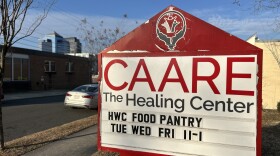In the next few months, homeless individuals camped outside in certain parts of Fayetteville may have to find a new place to sleep.
The City Council last week discussed the possible enactment of an ordinance that would give Fayetteville broader authority to clear homeless encampments in certain areas and under certain conditions.
After a lengthy discussion, though, and concerns voiced from some, the council decided to direct the city’s Homeless Encampment Task Force to look at the issue further, based on council feedback, and return again with an updated recommendation.
That task force is made up of representatives from several of the city’s institutions.
Fayetteville’s current ordinance regarding homeless encampments only prohibits overnight camping at parks and cemeteries.
The new ordinance discussed last week would allow the city to clear encampments on any city-owned property, including rights of way, which is public land usually used for roadways and utilities.
While encampments found on rights of way owned by the N.C. Department of Transportation, however, would not be covered under the potential ordinance, city officials said they are working with DOT to expand their authority to clear those areas as well.
The proposed ordinance would also prohibit camping or sleeping in a vehicle on private property without an owner’s written consent.
Under the potential new ordinance, the definition of camping would include lying in a prone position, and it would not be limited to overnight hours.
Brook Redding with the city manager’s office said the current language of the new ordinance would allow the city to clear the camps if there is shelter available to which the city could transport people.
Regardless of shelter capacity, though, the encampment could be cleared if the city decides it’s “a high risk to the public health and safety.”
“What we’re looking to recommend is a unified city policy that establishes a standardized procedure to clean up public property being used unlawfully for shelter or temporary residents,” said Chris Cauley, Fayetteville’s economic and community development director.
“The core point of this is to protect the health and safety when we find concerns where encampments have crossed the threshold to where they are a public health or public safety concern.”
He said the relocation of people who are unsheltered would be done in collaboration with community service providers.
“Our residents here in our community that are experiencing homelessness have the same civil rights as house residents,” Cauley said. “Unsheltered individuals will be treated with dignity and respect.”
Other major North Carolina municipalities have similar ordinances to the one Fayetteville is considering, according to city officials.
‘Where will they go?’
To determine the level of homelessness across the country, the U.S. Department of Housing and Urban Development collects annual data at the state and local levels, known as the point-in-time homeless count.
The PIT count, conducted on one day every year, measures the number of homeless people in a given community.
In Fayetteville, that count decreased from 515 in 2016 to 297 in 2020. Due to precautions associated with the COVID-19 pandemic, the number of homeless individuals not in shelters was not counted in 2021.
The preliminary count for 2022 increased to 475, though that is subject to change pending confirmation from HUD.
Council member Shakeyla Ingram, while understanding the safety issues with camping in rights of way, said she was concerned about what would happen to those displaced by the policy.
“Where will they go?” she asked.
“Besides getting on a bus and going to fill up somebody else’s homeless population number, where else will they go?”Shakeyla Ingram, Fayetteville council member
“If they present an environmental hazard to the community, even if there’s no shelter available. What other shelter is available? Besides getting on a bus and going to go fill up somebody else’s homeless population number, where else will they go?”
Cauley responded by clarifying that encampments will only be deemed unsafe if a group of people are camping, not just one individual.
“The large collection of individuals is what helps contribute to the public health and safety problem,” he said. “Where they go is somewhere that won’t cause a public health and safety problem.”
Cauley also added that beds are available at shelters most nights. The city is working with community partners to address the general need for more affordable housing in the community, he said.
“Part of the overall city strategy is to put a trauma informed, kind of triage, in place for these encampments,” Cauley said. “But then also partner with agencies to move people through the continuum of care and into permanent, supportive housing and transitional housing.”
Council member Yvonne Kinston said she was concerned with how this would affect others at risk of homelessness due to rising rent.
“A full-time employee working, rent is going up, and (they) cannot find an apartment to live anywhere, no family,” she said. “If this is in place the way it is now, I’m just concerned about how some of those people that are falling into this are going to be affected as well.”
According to Apartment List, a nationwide apartment listing service that also collects rental data, the average monthly rent in Fayetteville has increased from $980 two years ago to over $1,300 last month.
“There’s a recognition that the face of homelessness is not just folks on the side of the street,” Cauley said.
“There are single moms out there who have lost their housing and been evicted, and can’t figure out where to go next. There’s a lot of different scenarios under that umbrella term of people experiencing homelessness.”
Mayor Mitch Colvin said the discussion needed to be framed as a safety issue.
“We have to join our peers — Asheville, Charlotte, Raleigh, Wilmington, Winston Salem — in putting additional restrictions about what you can do in that area that we call (rights of way),” he said.
“Is it safe for people to continue to lay their heads beside the highway where cars go 50 and 60 and 70 miles per hours? That’s not a long-term sustainable solution for it.”Mitch Colvin, Fayetteville mayor
“Is it safe for people to continue to lay their heads beside the highway where cars go 50 and 60 and 70 miles per hour? That’s not a long-term sustainable solution for it. Plus what it looks like. Plus the public health risks that are involved in this from being able to spread disease and other things that we would normally regulate.”
The city needs to address other issues related to homelessness, which does not include letting people camp in rights of way, Colvin said.
“We’re really not doing them a favor by turning the other way and not bringing services to people who are camping outside these roads,” he said. “If we’re doing our job, there would not be a need for people to be camping beside the streets. Let’s not turn this into an issue of whether we care or not, because I think everybody on here cares about the outcome of these people.”
Efforts to address homelessness
The city, in partnership with community organizations, is designing the construction of the Homeless Day Resource Center, which will be on South King Street, east of downtown.
Funding for the project is from the N.C. Office of Recovery and Resiliency’s Community Development Block Grant and a grant program within the state’s capital infrastructure fund.
Construction is estimated to be completed in the spring of 2023, according to a presentation to the City Council at a meeting in early March.
Cape Fear Valley Health and Cumberland County are in the early stages of bringing a new homeless shelter to the area, CityView Today reported in March.






